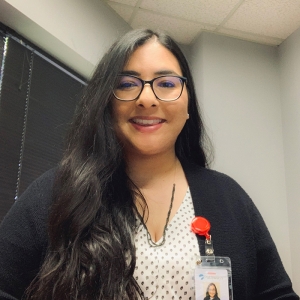In the Joy of Others Lies Our Own
August 09, 2020 / by Lynn Lipinski- Alumni
Jankee Pandya, MSW ’17, lives her life according to a simple creed she learned from the leader of her Hindu temple: “In the joy of others lies our own.”
Those eight words from His Holiness Pramukh Swami Maharaj form a call to action for Pandya that is more important than ever in her work in light of the COVID-19 pandemic.
Pandya is the clinical manager for Pathways in Orange County, providing counseling to youth ages 16-25 and families with chronic mental illness as well as supervising a team of case managers and supervisors.
Born and raised in Orange County, Pandya learned the value of cultivating empathy and respect for all people from her parents, immigrants who worked their way up from nothing to be successful, and prioritized helping others. Their lived example fuels her lifelong desire to pay it forward and find her own success and joy through service to those in need.
“I know having supportive people around me has been key to my success,” Pandya said. “I want to be the voice for someone who doesn’t have that.”
Standing true to the values her parents and spiritual practice instilled in her has earned Pandya the trust of the transitional age youth she has worked with for most of her career. Prior to joining Pathways, she was the teen director for three facilities of the Boys and Girls Clubs of America and held internships with the Orange County Department of Education in juvenile justice and with Kaiser Permanente in its outpatient psychiatry services and addiction medicine arm.
She also credits her master of social work studies at the USC Suzanne Dworak-Peck School of Social Work with teaching her to have an open mind when approaching each person she tries to help. “I think I gain trust with teens because I don’t walk in with a preset agenda,” Pandya said. Staying client-centered and focusing on the here and now are principles that form the foundation of her role in supporting and guiding her clients.
Facing the challenges of a pandemic
In her current role, her passion for improving the lives of others has taken on a new sense of urgency as the coronavirus pandemic amplifies the stress and challenges of daily life for those served at Pathways.
“For some of our clients, the pandemic wiped away progress, purpose and meaning,” Pandya said. Some clients had just gotten their first job or were preparing to start school as the pandemic shrank or dissolved those opportunities. Others, especially those in shared living spaces, chafed against restrictions that kept them homebound more than they liked.
Since the pandemic began, Pandya has seen much of her work, and that of the staff she oversees, shift to video and audio calls instead of in-person visits. This transition to remote care has been difficult for Pandya and her colleagues.
The clients, some of whom are chronically homeless, do not always have the ability to meet via web call. Meeting virtually has other challenges, such as the ability for Pandya and other counselors to assess the safety and wellbeing of the clients. For example, counselors can often pick up clues about someone’s mental state from physical changes in how they are taking care of themselves and how they are dressed. Sometimes these changes are not as apparent through video or phone sessions.
On top of difficulties with connection, Pandya and her team have also seen an increase in the number of crises among their clients, stemming from job loss, housing concerns and health issues, including a rise in suicidal thoughts and increased anxiety and depression. It’s hard for the clients, and it’s hard for the staff, she said.
Part of her job now is also providing support for her staff as they grapple with the additional pressure from their work as well as new challenges unique to COVID-19, such as children at home all day instead of at school. Ensuring staff are properly caring for themselves is the best way to make sure they can fully be ready to help clients.
The Pathways team has found creative ways to make things work. One simple way is through a twice-weekly video conference call where staff gathers to eat lunch together and talk about anything except work. The lunch session is largely unstructured time, though sometimes people are asked to share a joke or their latest self-care practice.
“People seem calmer and less stressed when the call is over,” Pandya said. In addition, weekly one-on-one check-ins with staff and the availability of employee assistance programs help Pandya and her fellow managers keep an eye on how staff are managing their workload and identify potential issues.
Carrying on through personal disappointment
Pandya experienced a personal disappointment herself during the pandemic, as the guest list for her long-planned wedding on March 14 had to be cut dramatically to meet health guidelines. A lasting image from that time is a roomful of relatives in her mother’s living room, each on their cell phones calling and texting guests to tell them not to come. Still, compared to the challenges she has witnessed others facing during the pandemic, she feels fortunate that her special celebration was able to go ahead, despite the reduced guest attendance.,
The MSW program gave Pandya a toolbox of resources she draws upon daily, in all aspects of her life. “It taught me to take care of myself, to do extracurricular activities and to have fun,” she said. Learning to balance the difficult work with self-care contributes to her overall resilience, a trait that has come in handy so far, and without a doubt will continue to do so.
To reference the work of our faculty online, we ask that you directly quote their work where possible and attribute it to "FACULTY NAME, a professor in the USC Suzanne Dworak-Peck School of Social Work” (LINK: https://dworakpeck.usc.edu)
